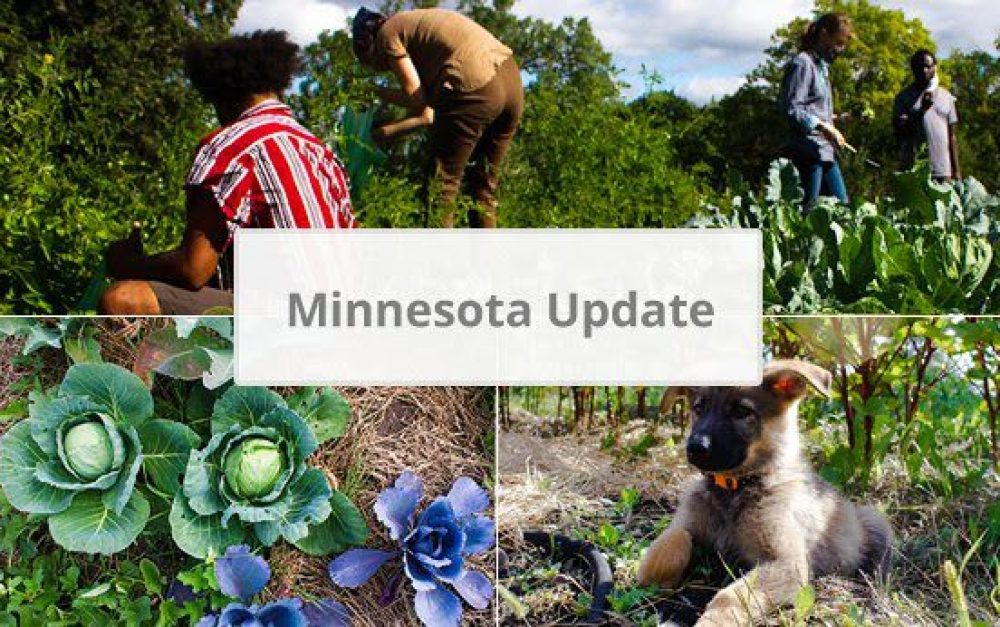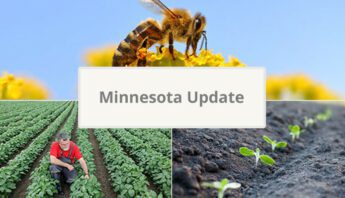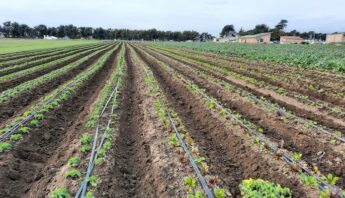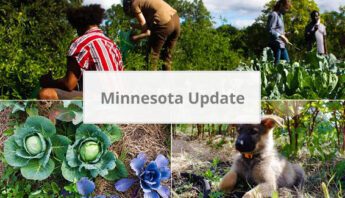Hello from the PAN Minnesota Team!
Sometimes all of the stress and urgency of the issues I organize around, life stuff, and organizing in a pandemic, makes me feel disconnected to people and my purpose. Thankfully, it’s usually not long before one of the people or groups I work with offers me a lifeline for reconnection.
I was in this place a couple of weeks back, overworked and feeling out of time, frustrated and impatient. That weekend I was able to be a part of a wonderful gathering of 15 farmers of color, including Dawn2Dusk Farm, GEDEF Farm, 40 Acres Cooperative, Zintkhalaluta Sacred Tree Garden, Urban Farm & Garden Alliance, Diaspora Gardens, Project Sweetie Pie, and others, to share seeds and wisdom, taste our season’s best produce, and talk about healing our communities, in community. The Midwest Farmers of Color Collective sponsored the gathering at my farm and retreat coop, Rootsprings. It was a beautiful time of deeper connection and relationship-building for work to come.
I’m thankful for these people, my work and the purpose I serve, and the practice of reconnecting that brings it all home.
With that, I’ll get right to the updates, calls to action, and invites below.
In solidarity,
Zoe
What does the federal chlorpyrifos ban mean for Minnesota?
Since EPA’s announcement last month to ban chlorpyrifos, we’ve gotten many questions about what this means for Minnesotans. For those of us who are new to the battle to ban chlorpyrifos, here’s a quick timeline from one of our Senior Scientists, Margaret Reeves. This timeline covers much of the policy work, community organizing, and grassroots science that PAN and partners have undertaken over the last two decades to protect communities from brain-harming chlorpyrifos. Also, take a look at this great background document by EarthJustice if you would like to learn more about this pesticide.
With this most recent court-required decision, many are asking, “So, really, what does this ban mean?”
The August 18 decision to ban the pesticide was specifically made for crops that are food products consumed by humans. This is certainly important for us in MN as our state has one of the highest rates of usage—and therefore community exposure—in the U.S. This decision means that an entire generation of children and young people living in rural communities will avoid exposure to this chemical.
For conventional farmers who now need to adapt to new practices, EPA’s decision may be both a challenging transition and an opportunity to adopt healthier pest management strategies. And there are models to follow, as farmers in other states and countries have successfully moved away from chlorpyrifos use to protect the health of their families and communities.
Let us know if you are struggling to figure out how you will adapt to this change and we will work to connect you with support.
This recent EPA decision revoking tolerance would apply to any residues of chlorpyrifos in food. This includes residues of the pesticide in animal feed or in meat, milk or other animal products that might consume the feed. Once tolerances (allowed pesticide residue in a crop) are revoked, the pesticide cannot be used on affected crops.
EPA hasn’t yet proposed the cancellation of registrations, which is different from crop tolerance levels. Non-food uses of chlorpyrifos for crops such as ethanol corn, seed and sod crops, flowers, or ornamental plants, could continue. Dow-Corteva has identified soybeans as one of the uses it wants to retain. All of the registrations for chlorpyrifos use are currently under review separate from the tolerance revocation.
In the meantime, we will continue to press for a complete ban of this toxic pesticide and other organophosphates in Minnesota and in the U.S.
BIPOC farmer & rancher debt relief program in danger
The American Recovery Act passed by Congress in March of this year, which allocated funds for debt relief to farmers and ranchers of color, is being halted by federal judges under pressure from conservative, white farmers in Florida, Texas, Wisconsin, and Minnesota. Their lawsuits and preliminary injunctions are claiming that aid based on race is racist—which ignores the immeasurable debt that is rightfully owed to the people whose land and labor have been exploited for centuries.
This strategy to prevent qualifying farmers of color from receiving aid does not seem to be about expanding the opportunity to all farmers since the lawsuits are not asking for white farmers to be included. Simply put, opponents just don’t want a program that benefits farmers and ranchers of color to exist. Sadly, there are even concerns spreading to our state government agencies about potential lawsuits for relief programs meant to help address disparities.
Fighting for racial equity is always right and we know it’s tied to our climate goals too. Farmers of color and farmers with limited resources, are leaders in agricultural climate solutions. They are innovators in our regional food systems and are key food providers for local communities. Their survival is critical to our climate resilience and a healthy, thriving, regional food system.
Let’s stand together to demand public investment in the people and practices that can feed us through a changing climate.
Contact your Congressional representatives and let them know we need them to fight for debt relief for farmers and ranchers of color in the American Recovery Act.
Interested in water policy?
The State Subcommittee on MN Water Policy was established in 2019 to review water policy reports and recommendations and assist the state legislature in formulating legislation. In a recent stakeholder meeting, the Subcommittee provided this presentation and invited input from individuals and groups on priorities and policy. On Wednesday, September 22, from 9am-10am CST, they will hear recommendations, which will be recorded on their Youtube channel for remote viewing. If water quality issues and policy are important to you, please sign up for the Subcommittee listserve or contact Jim Stark for more info at jim.stark@lcc.leg.mn.
Harvesting the fruit of our ancestors
A community event will be held in North Minneapolis, Saturday, September 25, from noon until 2 pm. All are welcome to this free event hosted by Project Sweetie Pie, Celestial Gardens, Midwest Farmers of Color Collective and Million Gardens Movement. Come to enjoy food and local art with urban farmers from the Twin Cities metro. There will be community discussions on climate change, seed saving, and more.








